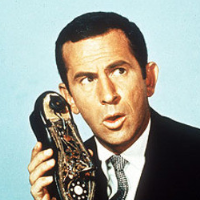ACLU Has Suggestion for Local Government Spy Tech Purchasers: Get Smart
 Don Adams and his "Get Smart" shoe phone
Don Adams and his "Get Smart" shoe phone
Nowadays, busy law enforcement agencies have scant time or resources to explore the multitude of ways they can conduct surveillance of their local communities. The long list of choices—automatic license plate readers, body cameras, drones, video surveillance, facial recognition, location tracking, automated social media monitoring, data mining and cell tower-emulating Stingrays—is daunting.
With this in mind, an unlikely source, the American Civil Liberties Union (ACLU) of California, has put together a guide for Making Smart Decisions about Surveillance (pdf) and made it available to residents, community leaders and, based on special emphasis given questions in the introduction, law enforcement officials.
As part of the guide, the ACLU included a model ordinance that cities and counties can use to ensure surveillance projects don’t do all the horrible things their proponents probably hope they will accomplish.
Events in Ferguson, Missouri, raised people’s awareness about the militarization of police using high-tech and high-powered weaponry to confront the citizenry, but decades of quieter police surveillance emboldened by National Security Agency (NSA) spying have, by and large, slipped under the radar.
The ACLU surveyed all 58 counties and the 60 largest cities in California and found expenditures of more than $65 million on surveillance technology over the past 10 years. Ninety of the 118 deployed at least one type of surveillance. Much of the money was provided by the federal government and few of the decisions were preceded by public input or as part of official public policy.
The ACLU maintains an interactive map that tracks surveillance across the state, but admits it is a work in progress—relying on sketchy government reports and news accounts—that probably greatly understates the scope of law enforcement activity.
The guide's introductory questions for the community are polite, almost delicate, in consideration of others’ sensibilities. But they suggest an underlying criticism of the widespread surveillance measures being rolled out across the country and could use with a bit of interpretive aid.
Here are some of the questions and their loose translations:
1. “What specific problem is your community trying to address?”
Who is the target of the surveillance?
2. “How effective will surveillance be in addressing this concern?”
What makes you think this will work?
3. “Are there alternatives that would be more effective, less expensive, or have less impact on civil liberties?”
Have you thought about this at all?
4. “What are the financial costs of surveillance, including long-term training, operation and maintenance?
How will this be paid for once the original federal money disappears?
5. “What impact would surveillance have on constitutional privacy, free speech, and civil rights?”
Does it bother anyone that this tramples on people’s privacy, free speech and civil rights?
6. “How could surveillance affect trust in law enforcement?”
Why would anyone trust a law enforcement agency that is spying on them?
7. “Have you completed a Surveillance Impact Report?”
Have you talked to any experts about what you’re doing?
8. “Have you sought input on priorities, costs and risks from all segments of your community?”
Does anyone know what you’re doing?
9. “Will there be public hearings and debate before seeking any funds or purchasing any technology?”
Will you be telling anyone before setting de facto policy and committing public resources?
10. “Have elected policymakers reviewed the Surveillance Impact Report and Surveillance Use Policy? Have they had an opportunity to hear public concerns? Will local policymakers specifically vote to approve the project moving forward? Will this happen before seeking any funds or purchasing any technology?”
Will the citizens’ elected officials be told about the surveillance and included in this process at all?
11. Will your community re-evaluate any surveillance program annually and determine whether the program should be continued, modified or abandoned?
Will anyone eventually check to see if this surveillance works?
–Ken Broder
To Learn More:
California Cities, Counties Have Spent $65M on Spy Tech in Past Decade (by Cyrus Farivar, Ars Technica)
ACLU: Police Surveillance Grows without Public Input (by Vivian Ho, San Francisco Chronicle)
Making Smart Decisions about Surveillance (American Civil Liberties Union of California) (pdf)
- Top Stories
- Controversies
- Where is the Money Going?
- California and the Nation
- Appointments and Resignations
- Unusual News
- Latest News
- California Forbids U.S. Immigration Agents from Pretending to be Police
- California Lawmakers Urged to Strip “Self-Dealing” Tax Board of Its Duties
- Big Oil’s Grip on California
- Santa Cruz Police See Homeland Security Betrayal in Use of Gang Roundup as Cover for Immigration Raid
- Oil Companies Face Deadline to Stop Polluting California Groundwater





